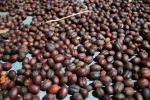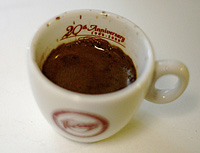
• One of My Favorites
The notes on this coffee from our importer are too precious to not include, so thanks Shrub folks!
Yemen Mokha Harazi
Farm Description
Harazi is a coffee from the district adjacent to Ismaili, and in fact they merge to some degree. If you travel west on the road from the capital Sana'a, toward Hodeidah on the Red Sea, you will pass quite close to Harazi. We visited an amazing zone within Harazi with towering, ancient stone villages, like castles precariously perched atop steep precipice. It was incredibly dramatic. All the coffee here is grown on terraces, since little land exists that is flat, except for the lowland deserts. This is an interesting flavor profile for Yemen too (well, they all are...) but very clean, and I fear a bit disappointing for those who want Yemeni coffee to taste like goat hides. It doesn't, and we won't buy those ratty Yemeni coffees that come from the South. But here we have I am not saying this cup is limp, but clean, sweetly fruited, and potent.
Cupping Notes
Harazi are very high-grown, and quite "clean" for a Yemeni coffee. The dry fragrance has sorghum syrup and banana scent in the light roasts, turning to molasses and aromatic wood notes (sandalwood scent) at FC+. Darker roasts are less sweet and more pungent in aroma, "noir" in character, less delicate. There's anise notes, cinnamon stick, and some dried apple. The light roast cups a bit milder at first than one might anticipate from Yemeni coffees, but intensifies greatly as it cools. The body is opaque, there's a bit of butterscotch, and a dusting of cocoa. As it cools, more dried fruit notes emerge, like the real health-food store (unsulphered) dried apricot and peaches, with a hint of leather and rustic woody notes. I get slight hints of camphor/menthol. Darker roasts are less complex; intense and pungent roasty overtakes the mild fruited tones. FC+ roasts are considerably less sweet. I did some test roasts specifically for single-origin (SO) espresso as soon as I realized what a balanced sweetness it had. Single-origin Yemen espresso has always finished too hidey, leathery, dusty-dirty for me. I knew right off this coffee, with it's clean cup character, had incredible SO espresso potential. Note that Yemeni coffees need rest after roasting. They have more aromatics at 24 hours rest, but really develop body and balance at 72+ hours of rest after roasting. This is even more true for espresso uses.
Chris Schooley adds: There is so much texture to this coffee without ever showing any really dusty earthiness, but more of a dry cocoa with just a hint of cumin in the thick honey finish. Winey fruit that showed dried apricot and dates with wild flowers and a nicely balanced sweetness.
Score




